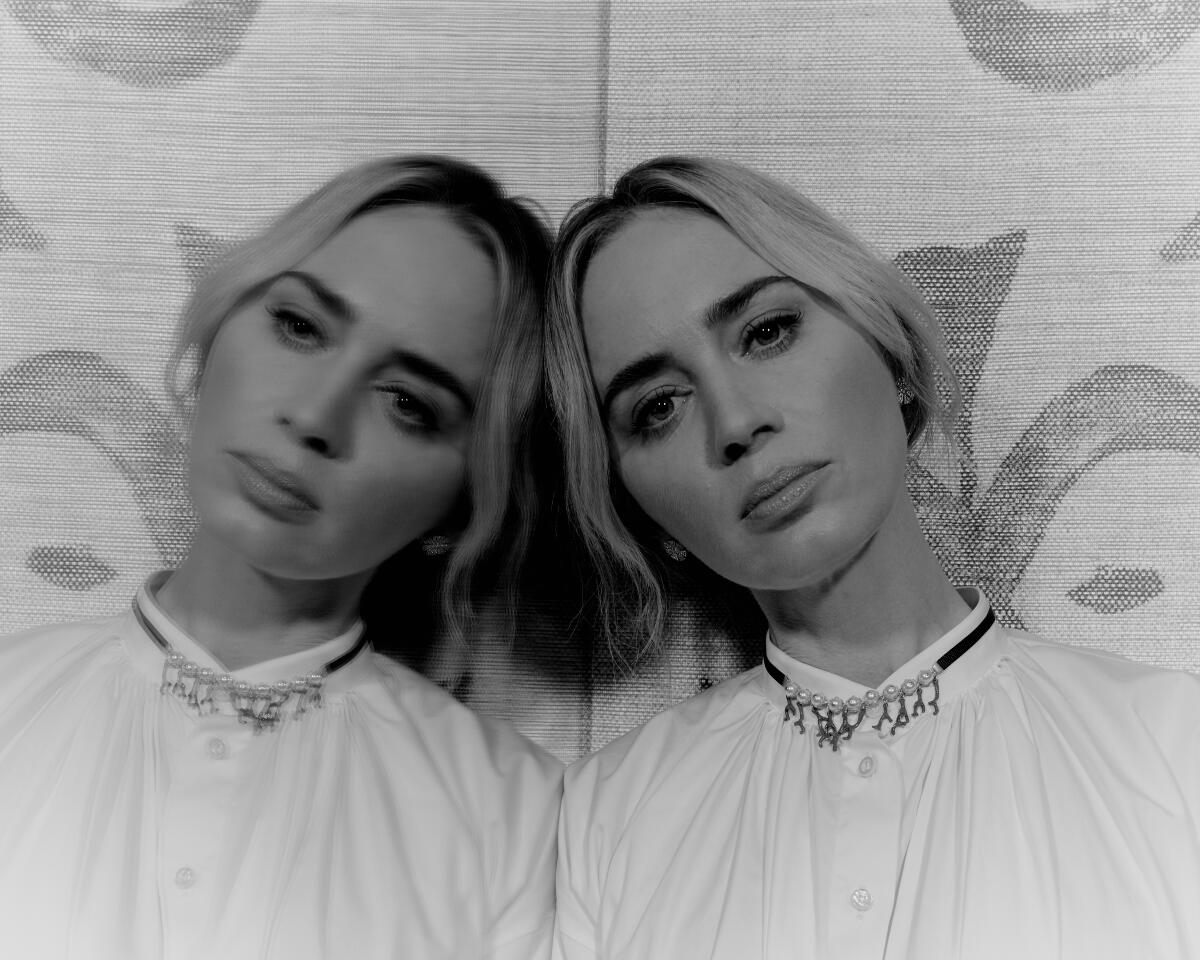Emily Blunt finds the thrill of revenge in ‘The English’

Don’t let the name throw you. “The English” is a western, set primarily in 1890. It’s also the term that Indigenous Americans gave to foreign interlopers, regardless of nationality, who came West seeking their fortunes no matter the cost. Writer-director-executive producer Hugo Blick (“The Honorable Woman”) created a tale that is by turns eerie, grisly and beautiful.
Emily Blunt plays Lady Cornelia Locke, driven from England to America by grief and vengeance. She meets Eli Whipp (Chaske Spencer), a Pawnee ex-cavalry scout, as he tries to make his way back to a home that no longer awaits him. Discussing his inspiration via email, Blick writes, “When a country is reforged, for those who stand in its way, the dreams turn to nightmares. I was interested to tell a love story about two very different people who stood in the way.”
Speaking by Zoom, decked out in a shimmering white dress with a high neckline that would suit Cornelia, Blunt, who also served as an executive producer on the Amazon limited series, is happy to revisit a character she doesn’t really want to shake.
This tale is full of unexpected turns with extra half-twists on top. Is that what first hooked you when you read the scripts?
I was completely captivated by being endlessly surprised and knocked sideways by it. It is the kind of show that cuts you off at the knees when you think you’re walking in the right direction. I was always stunned by the body count alone, by the people who were mercilessly done away with, with such velocity. But what’s beautiful and brilliant about Hugo Blick is that there’s something joyous about the way he writes — “Oh, you like that character? They’re gone now, but I’ve got 10 more, and wait for this.” — and such confidence in how he would create the next saga and the next obstacle and the next bout of violence. There’s joy in it, and I felt that in the script.
Cornelia does her part to raise that body count.
That was very exciting to play, because she seems to want to enact revenge with quite a lot of enthusiasm and positivity, and she’s quite frank about it, and seems to live rather fearlessly. And then you’ve got the humanity of the aftermath of those moments, of how she reckons with what she’s just done. I do like that her guilt about doing away with people dwindles as the series goes on, because she knows she’s heading with this great propulsion toward her final destination of the big bad wolf.
That would be Melmont, played by the astonishing Rafe Spall.
Like a lethal Ferrari, he comes into the show. Like a wild animal. And it was like doing scenes with a wild animal at times. Luckily, he’s the most gorgeous person off-set, and we had such a laugh sightseeing around Madrid together. But he was an extraordinary scene partner, with just the right amount of unpredictability that kept me up at night after we’d do those scenes. I’d be thinking about them all night, they’d be in my body, they’d be in my veins, they were just so intense.
Then we have your leading man, Chaske Spencer, whose Eli is diametrically opposed to Melmont.
Let me talk about how transformative he is as a person, because when you meet Chaske, he’s a very animated, warm, ebullient sort of person, and for all of that to simmer down and submarine, and for him to play with such restraint, just took guts — to do nothing and know it’s going to be magnetic. He has charisma up the wazoo. I said to him today, “You’re going to have hearts pounding all over the world for this character.” But he’s such a lovely person.
Does adding executive producer to the mix this time around affect your approach to performing in any way, or do you take off that hat while you’re shooting?
I do take it off completely while shooting, because I know this kind of character is going to require all of me. With any project I work on, I feel like I’m looking at it from the inside out, so I never watch dailies, I don’t watch playback. I don’t find it helpful; I have no interest in it. Then after I’m done filming, and that intimacy I have with it is over, I really don’t mind seeing it reflected back at me. And I can be quite objective. It has become clear to me over the years, being around the block as long as I have, that I don’t just want to do the acting side of things. I’m interested in every facet of it — the editing, the color timing, the music, all of it. It’s just about choosing when the hat goes on and when it goes off. I don’t know how to do both when I’m filming.
Was it hard to let Cornelia go after the shoot was over?
She and this show will have its fingerprints on me forever. I truly was so impacted by it, and by the experience of playing her, not only because of the tragedy and the dignity of her story, but her endless hopefulness. There’s that buoyancy in the character that’s so surprising even after suffering so much, that I think she’s a real figure of hope for people. She felt like such a beacon to me. I just was in love with her, so it was really hard to say goodbye to her in the end.
More to Read
From the Oscars to the Emmys.
Get the Envelope newsletter for exclusive awards season coverage, behind-the-scenes stories from the Envelope podcast and columnist Glenn Whipp’s must-read analysis.
You may occasionally receive promotional content from the Los Angeles Times.








